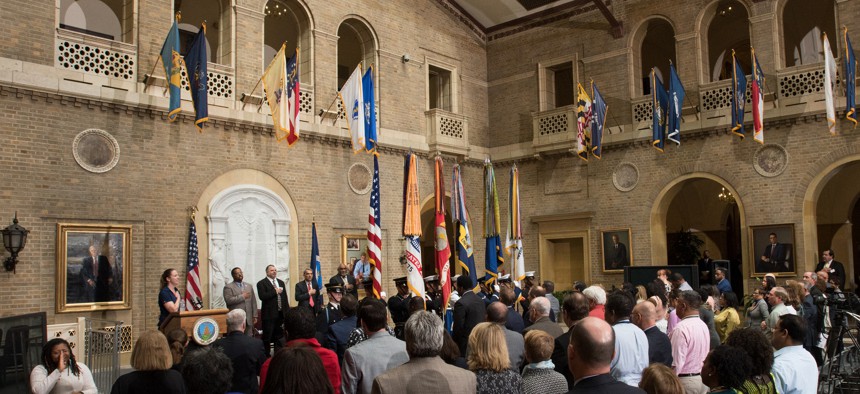
USDA employees gather for the Unsung Hero Award Program of the Organization of Professional Employees of the U.S. Department of Agriculture in Washington on May 4, 2017. Agriculture Department
Public Service: A Career with Purpose
This week is the perfect time to highlight the tremendous opportunities to do good in government.
I didn’t start adulthood envisioning a life of public service. I accepted an appointment to West Point as a way to pay for college and make sure I had a job when I graduated. This, I thought, was a very practical, but not particularly altruistic, logic. My plan to serve out my five-year commitment and then move on to a civilian career went awry somewhere along the line, and I found myself, after 20 years of exciting, rewarding and challenging assignments, retiring from the Army.
Like many veterans who find the transition from active duty difficult, I couldn’t find an offer of civilian employment that seemed nearly as interesting as the work I’d been doing, so I became a federal civil servant. There, I found work that satisfied my desire to make a difference and to serve a purpose greater than myself. Perhaps that’s one reason why, in 2016, nearly 22 percent of all employed veterans worked for the government at either the federal (10 percent), state (4.9 percent), or local (7 percent) level. The figures are even higher for Gulf War II-era veterans, with over 28 percent working in government.
Coincidentally, May’s calendar shows both Military Appreciation Month and Public Service Recognition Week. But it’s not just veterans hoping to continue their service who are seeking government employment. According to the 2013 National Association of Colleges and Employers Student Survey, which asked students about their employment objectives -- including immediate plans after graduation, ideal career, salary expectations and what they consider to be the most important attributes for their first job -- recent college graduates said they would most like to work in government, human services, professional services/consulting, social services or education.
Much has been written about what government agencies can do to improve their recruitment and retention of this new generation, but I am encouraged that some form of public service is at the top of their list. Some organnizations have become very creative in recruiting millennials -- for example, by creating videos that include an appeal to their search for careers with meaning and purpose.
A career with purpose is what so many of us want. Public Service Recognition Week is the perfect time to highlight the tremendous opportunities to do good through public service by relating the stories of those who have served. The National Academy of Public Administration consists of more than 850 fellows who have been nominated into membership as a result of incredible accomplishments in the public sector. From our founding fellows like James Webb, Dwight Ink and George Frederickson to our newest fellows, such as Jennifer Pahlka, Denise Turner Roth and Tina Nabatchi, the academy’s fellows represent the very best in public servants across federal, state, and local government; academia; and the nonprofit sector over the past 50 years.
Amidst all of the talk these days about “draining the swamp,” Public Service Recognition Week reminds us that millions of our fellow citizens willingly take on the hard and selfless work of serving the rest of us through government programs. Many of the academy’s fellows are actively at work in towns and cities across the country, where government meets its citizens, finding innovative solutions to complex problems so that government works better.
Stories about these inspiring fellows can be found on the NAPA website. Collectively, they represent an organization whose vision is to “make government work, and work for all.” They can encourage all of us, and remind us that the future of public service is bright. I am honored to represent them and to serve with them.
Terry Gerton is president and CEO of the National Academy of Public Administration.






